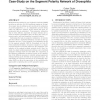Free Online Productivity Tools
i2Speak
i2Symbol
i2OCR
iTex2Img
iWeb2Print
iWeb2Shot
i2Type
iPdf2Split
iPdf2Merge
i2Bopomofo
i2Arabic
i2Style
i2Image
i2PDF
iLatex2Rtf
Sci2ools
118
click to vote
GECCO
2009
Springer
2009
Springer
Multiobjectivization for parameter estimation: a case-study on the segment polarity network of drosophila
Mathematical modeling for gene regulative networks (GRNs) provides an effective tool for hypothesis testing in biology. A necessary step in setting up such models is the estimation of model parameters, i.e., an optimization process during which the difference between model output and given experimental data is minimized. This parameter estimation step is often difficult, especially for larger systems due to often incomplete quantitative data, the large size of the parameter space, and non-linearities in system behavior. Addressing the task of parameter estimation, we investigate the influence multiobjectivization can have on the optimization process. On the example of an established model for the segment polarity GRN in Drosophila, we test different multiobjectivization scenarios compared to a singleobjective function proposed earlier for the parameter optimization of the segment polarity network model. Since, instead of a single optimal parameter setting, a set of optimal paramete...
Artificial Intelligence | GECCO 2009 | Optimal Parameter Settings | Parameter | Parameter Estimation |
| Added | 26 May 2010 |
| Updated | 26 May 2010 |
| Type | Conference |
| Year | 2009 |
| Where | GECCO |
| Authors | Tim Hohm, Eckart Zitzler |
Comments (0)

